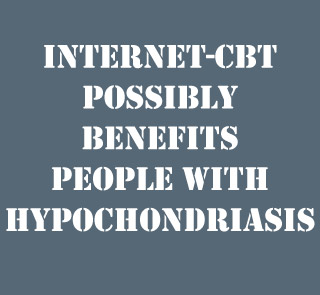
The study enrolled 81 people diagnosed with hypochondriasis among which 40 received online CBT during a 12-week period. All through the treatment, participants had access to a qualified therapist who provided feedback and support. The remaining 41 patients formed the control group and were given access to an online discussion forum where they could talk about their health anxiety with other patients. On completion of 12 weeks, the patients who received internet-based CBT reportedly were less anxious with fewer depressive symptoms than the control group.
“Our findings are promising for people with hypochondriasis,” shared Erik Hedman, Doctoral Student at the Department of Clinical Neuroscience and first author of the study. “The study suggests that this treatment approach is effective in reducing people’s health anxiety, as well as general anxiety and depressive symptoms. Internet-based therapy is cheaper than face-to-face therapy, and can also be delivered more flexibly, meaning it provides an opportunity for dramatically increasing the availability of CBT to people with hypochondriasis.”
All in all, 27 of the 40 patients representing 67.5 percent provided with online CBT treatment allegedly revealed no signs of hypochondriasis. Within the control group, only 2 of the 41 patients presenting 4.9 percent probably had no criteria for diagnosing with the condition. The investigation continued for another 6 months which shed light on the seeming positive effects of online CBT treatment.
The study is published in the British Journal of Psychiatry.
